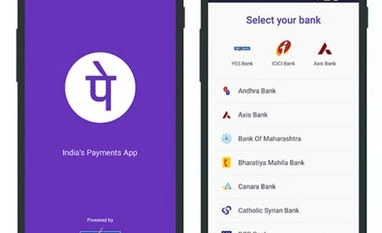Late last year, when Flipkart went through a major restructuring backed by its new owner Walmart, after the exit of co-founder and then Group CEO Binny Bansal, one thing that surprised many was the move to allow PhonePe, the payments arm, to operate almost independently, and away from the clutches of the Bengaluru-based e-commerce firm.
More than six months since, when several of the top global investors and technology companies are understandably making beeline to invest into the Sameer Nigam-led company, it only makes things clearer as to what the intention back then was. It's not just that PhonePe has been able to attract marquee investors. The Bengaluru firm is fast emerging as the would-be front-runner in the highly competitive consumer payments market, giving tough competition to most of the existing players in this space.
The story in numbers
According to data from market intelligence firm KalaGato, in the year to March, PhonePe’s market share has risen from 18.9 per cent to 33.4 per cent. While Paytm still maintains the lead, with its share hovering around 42 per cent, PhonePe’s growth has come largely at the expense of smaller players. In this period, Mobikwik’s market share fell from eight per cent to three per cent, KalaGato data showed, while that of BHIM, the government’s own UPI app, declined from 10.8 per cent to 9.8 per cent.
As of March 2019, PhonePe app was used in 53 per cent of the smartphones available in the domestic market, compared to Paytm’s 51.3 per cent, according to KalaGato.
“PhonePe followed the Paytm model of luring users through cash-back offers, and has executed that very well. Now investors want a slice of the growth,” said an analyst who tracks the payments space quite closely, wishing not to be named.
Investor interest
PhonePe’s growth is stupendous given that the company is only four years old and if media reports are to be believed, tier-I investors starting from Tiger Global Management to KKR are lining up to buy into the company. The deal is expected to fetch the company a valuation of $8-10 billion, according to reports.
If it goes through, the deal will be a huge win for Flipkart and Walmart. When Walmart acquired 77 per cent in Flipkart in 2018-mid, PhonePe was only seen as a small ancillary, albeit growing business. But by capitalising on a burgeoning mobile payments market, it has emerged to become a major asset.
With this, Flipkart (along with Walmart) stands to make a great deal of money (when investors buy its stake in PhonePe), while still maintaining a sizeable holding in a growing payments business. According to sources, early this year, Flipkart’s board gave an in-principal approval to hive off PhonePe as a separate entity and on-board new investors.
PhonePe was launched in 2015 by former Flipkart executives Sameer Nigam, Rahul Chari and Burzin Engineer, a year before getting acquired. It was among the first to create payments over UPI, India’s indigenous payment network, launched in 2016.
Rapid growth
Under Flipkart, the company grew multi-fold, using subsequent cash infusions to gain customer through cash-backs and other offers. The company aggressively tied up with all internet services as a payments mode and on-boarded offline merchants (with its QR code-based solution) at break-neck pace. It currently facilitates about 35 million transactions every month and services 500,000 merchants offline.
In December, PhonePe said it had crossed a billion UPI transactions, in all of 26 months since setting up. The figure was 100 million in June 2018.
It remains to be seen which investors back PhonePe. Alibaba and its fin-tech subsidiary are backing Paytm, while Naspers has a large footprint through PayU, which has made a slew of acquisitions, including Citrus Pay in 2016. Amazon is an investor in Capital Float. Tencent, which operates the hugely popular WeChat in China, does not have a direct investment in a payments company so far.
The fight has become even more charged up after the entry of Google Pay and Amazon Pay, payment offerings by two of the largest technology companies in the world. Paytm, on the other hand, is expanding its clout through investments in an array of e-commerce platforms such as Insider and Nearbuy, apart from investing in its mutual funds business, Paytm Money. At the same time, experts are aware that WhatsApp's entry into consumer payments has all the ingredients to completely disrupt the segment.
There is going to be a shake-out in the payments space, says Mahesh Makhija, partner and leader, digital and emerging tech, at EY.
"Banks need to offer holistic payment solutions to their customers and will leverage UPI and its emerging features in a bid to capture transaction share. Big tech companies will want to increase stickiness on their platforms -- for them payments are also a rich source of data to better profile their customers. These players will be willing to play the long game and will invest heavily to drive volume,” says Makhija. “Finally, there are FinTechs attempting to differentiate via significantly smoother payment experiences. I see this segment facing tremendous pressure as BigTechs and banks expand their offerings."
| Market share of top-4 in the payments space |
| | March 2018 | August 2018 | March 2019 |
| Paytm | 42.1 | 44.2 | 42.8 |
| PhonePe | 18.9 | 24.7 | 33.4 |
| BHIM | 10.8 | 11.6 | 9.8 |
| Mobikwik | 8.0 | 5.5 | 3.0 |
| Figures in percentages; Source: KalaGato.co |
Unlock 30+ premium stories daily hand-picked by our editors, across devices on browser and app.
Pick your 5 favourite companies, get a daily email with all news updates on them.
Full access to our intuitive epaper - clip, save, share articles from any device; newspaper archives from 2006.
Preferential invites to Business Standard events.
Curated newsletters on markets, personal finance, policy & politics, start-ups, technology, and more.
)